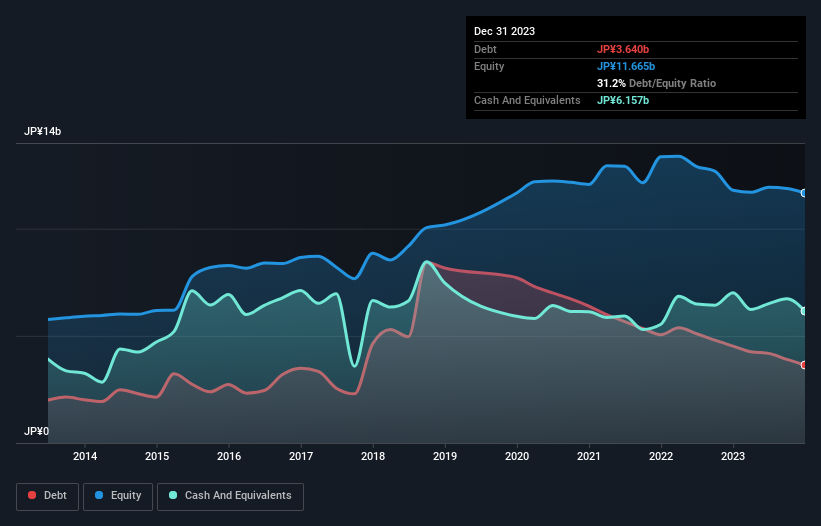Some say volatility, rather than debt, is the best way to think about risk as an investor, but Warren Buffett famously said that 'Volatility is far from synonymous with risk.' It's only natural to consider a company's balance sheet when you examine how risky it is, since debt is often involved when a business collapses. As with many other companies BroadBand Tower, Inc. (TSE:3776) makes use of debt. But the more important question is: how much risk is that debt creating?
What Risk Does Debt Bring?
Debt is a tool to help businesses grow, but if a business is incapable of paying off its lenders, then it exists at their mercy. In the worst case scenario, a company can go bankrupt if it cannot pay its creditors. However, a more common (but still painful) scenario is that it has to raise new equity capital at a low price, thus permanently diluting shareholders. Of course, the upside of debt is that it often represents cheap capital, especially when it replaces dilution in a company with the ability to reinvest at high rates of return. When we examine debt levels, we first consider both cash and debt levels, together.
See our latest analysis for BroadBand Tower
What Is BroadBand Tower's Net Debt?
As you can see below, BroadBand Tower had JP¥3.64b of debt at December 2023, down from JP¥4.52b a year prior. But it also has JP¥6.16b in cash to offset that, meaning it has JP¥2.52b net cash.

A Look At BroadBand Tower's Liabilities
According to the last reported balance sheet, BroadBand Tower had liabilities of JP¥4.27b due within 12 months, and liabilities of JP¥3.54b due beyond 12 months. On the other hand, it had cash of JP¥6.16b and JP¥1.92b worth of receivables due within a year. So it can boast JP¥262.0m more liquid assets than total liabilities.
This short term liquidity is a sign that BroadBand Tower could probably pay off its debt with ease, as its balance sheet is far from stretched. Succinctly put, BroadBand Tower boasts net cash, so it's fair to say it does not have a heavy debt load! When analysing debt levels, the balance sheet is the obvious place to start. But it is BroadBand Tower's earnings that will influence how the balance sheet holds up in the future. So if you're keen to discover more about its earnings, it might be worth checking out this graph of its long term earnings trend.
Over 12 months, BroadBand Tower made a loss at the EBIT level, and saw its revenue drop to JP¥13b, which is a fall of 6.3%. We would much prefer see growth.
So How Risky Is BroadBand Tower?
Although BroadBand Tower had an earnings before interest and tax (EBIT) loss over the last twelve months, it made a statutory profit of JP¥99m. So when you consider it has net cash, along with the statutory profit, the stock probably isn't as risky as it might seem, at least in the short term. We'll feel more comfortable with the stock once EBIT is positive, given the lacklustre revenue growth. There's no doubt that we learn most about debt from the balance sheet. However, not all investment risk resides within the balance sheet - far from it. Be aware that BroadBand Tower is showing 4 warning signs in our investment analysis , and 2 of those are a bit concerning...
If, after all that, you're more interested in a fast growing company with a rock-solid balance sheet, then check out our list of net cash growth stocks without delay.
Valuation is complex, but we're here to simplify it.
Discover if BroadBand Tower might be undervalued or overvalued with our detailed analysis, featuring fair value estimates, potential risks, dividends, insider trades, and its financial condition.
Access Free AnalysisHave feedback on this article? Concerned about the content? Get in touch with us directly. Alternatively, email editorial-team (at) simplywallst.com.
This article by Simply Wall St is general in nature. We provide commentary based on historical data and analyst forecasts only using an unbiased methodology and our articles are not intended to be financial advice. It does not constitute a recommendation to buy or sell any stock, and does not take account of your objectives, or your financial situation. We aim to bring you long-term focused analysis driven by fundamental data. Note that our analysis may not factor in the latest price-sensitive company announcements or qualitative material. Simply Wall St has no position in any stocks mentioned.
About TSE:3776
BroadBand Tower
Provides computer and media solutions platforms in Japan.
Flawless balance sheet and fair value.
Market Insights
Community Narratives




